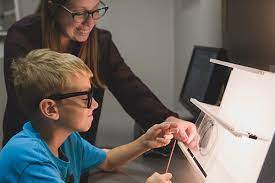
What is vision therapy?
“Vision therapy” is a term used by optometrists. Optometrists define vision therapy as an attempt to develop or improve visual skills and abilities; improve visual comfort, ease, and efficiency; and change visual processing or interpretation of visual information. An optometric vision therapy program consists of supervised in-office and at-home reinforcement exercises performed over weeks to months. In addition to exercises, lenses (“training glasses”), prisms, filters, patches, electronic targets, or balance boards may be used.
What is involved in a Vision Therapy program?
It consists of a comprehensive program of ‘exercises’, performed under the care of an Ophthalmologist and Developmental Optometrist. The program is
- Individualized to fit the diagnosis & visual needs of each patient
- Conducted in the clinic, once or twice weekly in sessions lasting for 30 to 60 minutes. If needed, it can be supplemented by home exercises.
- Binocular Vision Therapy is advised to improve fundamental visual skills and abilities, to improve visual comfort, ease & efficiency, and to change how a patient processes or interprets visual information.

What is involved in a Vision Therapy program?
- Individualized to fit the diagnosis & visual needs of each patient
- Conducted in the clinic, once or twice weekly in sessions lasting for 30 to 60 minutes. If needed, it can be supplemented by home exercises.
- Binocular Vision Therapy is advised to improve fundamental visual skills and abilities, to improve visual comfort, ease & efficiency, and to change how a patient processes or interprets visual information.
